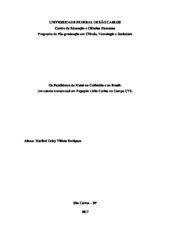Mostrar el registro sencillo del ítem
Os fundidores de metal na Colômbia e no Brasil: um estudo transversal em Popayán e São Carlos no campo CTS
| dc.contributor.author | Enríquez, Maribel Deicy Villota | |
| dc.date.accessioned | 2018-05-24T12:02:08Z | |
| dc.date.available | 2018-05-24T12:02:08Z | |
| dc.date.issued | 2017-12-21 | |
| dc.identifier.citation | ENRÍQUEZ, Maribel Deicy Villota. Os fundidores de metal na Colômbia e no Brasil: um estudo transversal em Popayán e São Carlos no campo CTS. 2017. Dissertação (Mestrado em Ciência, Tecnologia e Sociedade) – Universidade Federal de São Carlos, São Carlos, 2017. Disponível em: https://repositorio.ufscar.br/handle/ufscar/10110. | * |
| dc.identifier.uri | https://repositorio.ufscar.br/handle/ufscar/10110 | |
| dc.description.abstract | The present study aims to describe and characterize the transformations of the handcrafted crafts in metallurgy and goldsmithing in Popayán - Colombia and São Carlos - Brazil, through a transversal study in relation to the trade of the blacksmith and jeweler. It is an interdisciplinary study carried out in the perspective of social studies of science and technology (CTS). Adopting the descriptive methodology, combining techniques of the ethnographic and historical method, in particular the collaborative investigation. Procedures were adopted for documentary analysis: the history of life and the reflective interview for purposes of data collection and empirical research. Seven artisans of both sexes, aged between 38 and 70 years, living in Popayán - Colombia and São Carlos / SP, Brazil, were interviewed. All ethical procedures in human research were observed. To analyze the data, we focus on three axes: the change of the blacksmith and jeweler's office, the life histories of the participants and the characterization of the craft techniques from distant times until today. Considering the significant changes in the surroundings of the craft trades today, the construction of the new social relations of the environment and the artisans is identified and analyzed. The presence of the theme of aging is pointed out, being the craftsman a protagonist of the active aging, whose work carried out during the life is strongly influenced by the technical-technological transformations. Being a craftsman is a profession that takes itself in the continuity of time, but that today is losing the possibility of being transmitted. | eng |
| dc.description.sponsorship | Coordenação de Aperfeiçoamento de Pessoal de Nível Superior (CAPES) | por |
| dc.language.iso | por | por |
| dc.publisher | Universidade Federal de São Carlos | por |
| dc.rights.uri | Acesso aberto | por |
| dc.subject | Tecnologia | por |
| dc.subject | Ferreiros | por |
| dc.subject | Joalheiros | por |
| dc.subject | Ofícios artesanais | por |
| dc.subject | Mudança social | por |
| dc.subject | CTS | por |
| dc.subject | Envelhecimento | por |
| dc.subject | Technology | eng |
| dc.subject | Blacksmiths | eng |
| dc.subject | Jewelers | eng |
| dc.subject | Crafts | eng |
| dc.subject | Social change | eng |
| dc.subject | CTS | eng |
| dc.subject | Aging | eng |
| dc.title | Os fundidores de metal na Colômbia e no Brasil: um estudo transversal em Popayán e São Carlos no campo CTS | por |
| dc.title.alternative | Los fundidores de metal en Colombia y Brasil: un estudio transversal en Popayán y São Carlos en el campo CTS | eng |
| dc.type | Dissertação | por |
| dc.contributor.advisor1 | Pedro, Wilson José Alves | |
| dc.contributor.advisor1Lattes | http://lattes.cnpq.br/8135701448186851 | por |
| dc.description.resumo | O presente estudo tem por objetivos descrever e caracterizar as transformações dos ofícios artesanais na metalurgia e a ourivesaria em Popayán – Colômbia e São Carlos – Brasil, através de um estudo transversal em relação com o oficio do ferreiro e joalheiro. Trata-se de um estudo interdisciplinar realizado na perspectiva dos estudos sociais das ciências e das tecnologias (CTS). Adotando a metodologia descritiva, combinando técnicas do método etnográfico e histórico, em particular a investigação colaborativa. Adotou-se procedimentos de análise documental: a história de vida e a entrevista reflexiva para fins de coleta de dados e pesquisa empírica. Foram entrevistados sete artesãos de ambos sexos com idade entre os 38 e 70 anos, residentes em Popayán - Colõmbia e São Carlos/SP, Brasil. Todos os procediemtos éticos da pesquisa com seres humanos foram observados. Para análise dos dados, nos centramos em três eixos: a mudança do oficio do ferreiro e joalheiro, as histórias de vida dos participantes e a a caracterização das técnicas artesanais desde tempos distantes até hoje. Considerando-se as significativas mudanças no entorno dos ofícios artesanais hoje, identifica-se e analisa-se a construção das novas relações sociais do entorno e os artesãos. Aponta-se transversalmente a presença do tema de envelhecer sendo o artesão um protagonista do envelhecimento ativo, cujo trabalho exercido ao longo da vida é fortemente influenciado pelas transformações técnico-tecnológicas. Ser artesão é uma profissão que se leva na continuidade do tempo, mas que hoje está perdendo a possibilidade de ser transmitida. | por |
| dc.publisher.initials | UFSCar | por |
| dc.publisher.program | Programa de Pós-Graduação em Ciência, Tecnologia e Sociedade - PPGCTS | por |
| dc.subject.cnpq | CIENCIAS HUMANAS::ANTROPOLOGIA | por |
| dc.description.sponsorshipId | CAPES: 33001014 | por |
| dc.ufscar.embargo | Online | por |
| dc.publisher.address | Câmpus São Carlos | por |
| dc.contributor.authorlattes | http://lattes.cnpq.br/6524738672317276 | por |
